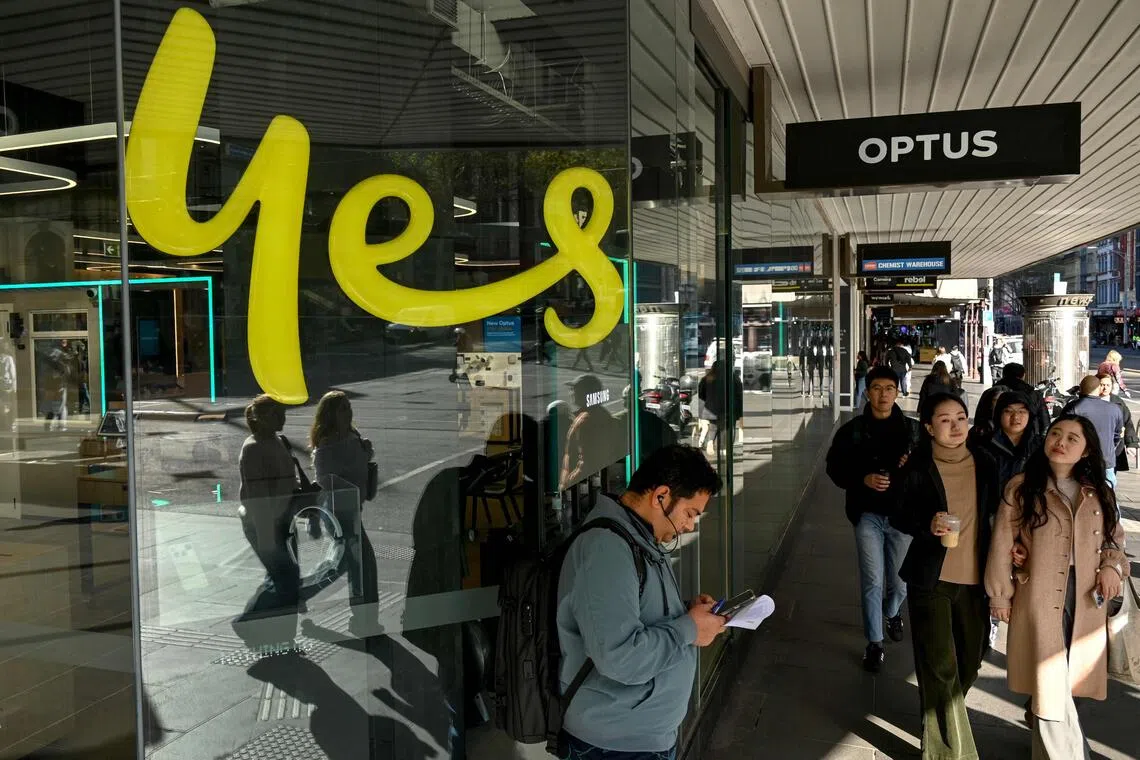Optus outage in Australia sparks public fury and calls for telco sector overhaul
Sign up now: Get insights on Asia's fast-moving developments

Optus, Australia’s second-largest telecommunications company, now faces intense scrutiny, including an investigation by the communications regulator.
PHOTO: AFP
Follow topic:
- Optus, Australia's second-largest telco, faced a 13-hour outage impacting emergency services, linked to three deaths and slow authority notification.
- Experts cite underinvestment in infrastructure as the cause and delays in Optus communicating with emergency services as "flabbergasting".
- Government review and sector overhaul demanded due to fragility, cost-cutting; Optus is under intense scrutiny and faces consequences.
AI generated
SYDNEY – Singtel-owned Optus, Australia’s second-largest telecommunications company, is facing public fury over an emergency services outage that has been linked to three deaths and prompted calls for an overhaul of the entire industry.
Optus triggered the 13-hour outage on Sept 18
The company now faces intense scrutiny, including an investigation by the communications regulator, as it deals with questions about the length of time it took to notify the authorities and why customer complaints about the outage were not escalated.
Telecommunications experts say the crisis stemmed from underinvestment in infrastructure, and should lead to broader questions about the current state of the nation’s telecommunications sector. Australia’s biggest telecommunications firm, Telstra, has also faced its own network failures, including an emergency services outage in March 2024.
A telecommunications consultant, Mr Paul Budde, told The Straits Times that there has been inadequate investment by Australia’s biggest telecommunications firms in infrastructure in the past two decades. He said the underinvestment has occurred as profits have been squeezed and “digital giants such as social media firms took the cream of the telecommunications profits”.
“Everybody blames Optus for this crisis,” he said. “Obviously, they will be punished, and trust in the firm is now completely gone. But the underlying issue is far more important: What is wrong with our infrastructure?”
During the outage, more than 600 emergency calls failed, mostly from South Australia, Western Australia and the Northern Territory. In Australia, 000 is the primary emergency number.
The Optus outage has dominated news coverage in Australia, including front-page headlines such as “Floptus” and “Optus’ deadly shame”. At least three people died in cases linked to the outage – a 49-year-old man and a 74-year-old man in Perth, and a 68-year-old woman in Adelaide.
The firm has revealed that five customers contacted Optus’ overseas call centre to say that they could not contact emergency services, but these calls were not escalated.
Australian Prime Minister Anthony Albanese on Sept 22 questioned the future of Optus’ chief executive Stephen Rue
The latest crisis comes after the telco suffered a nationwide phone and internet outage in November 2023 that affected critical services for consumers and businesses as well as essential government, public health and safety infrastructure. Then CEO Kelly Bayer Rosmarin resigned on Nov 20 that year.
The federal regulator, the Australian Communications and Media Authority (ACMA), found that Optus had failed to provide access to the emergency call service for 2,145 people during the 2023 outage. The company was fined A$12 million (S$10.2 million) in 2024.
Mr Budde said Optus’ delays in communicating and updating about the emergency services outage to politicians and the emergency services authorities during the latest outage were “flabbergasting”, especially after the scrutiny it faced over communications problems following its 2023 outage.
But he said the federal government should conduct an independent review into the entire sector, which could result in changes such as federal funding for telecommunications infrastructure and an independent emergency services network.
“This infrastructure is far too important to let it run down,” he said.
Echoing this view, Associate Professor Mark Gregory, a telecommunications expert at RMIT University, told ST that the latest outage was “absolutely avoidable” and showed that the firm did not have adequate testing in place. But he also said the failures were symptomatic of a broader lack of standards and enforcement across the sector.
“Optus’ reliability has been diminishing – whether this is because of cost-cutting or lax practices in the organisation, we don’t know,” he said.
“We are seeing evidence that the entire industry needs to be brought in line with community expectations.”
The outage began after Optus launched a network upgrade at 12.30am on Sept 18 that resulted in a technical failure, but the firm was not aware of the extent of the problem until about 1.30pm the same day.
Mr Rue has ordered an independent review into the incident and said the firm was urgently looking into its processes for notifying regulatory and government agencies about faults.
“In the short term, I have put in place an immediate halt to further changes in our network system until we have a broader understanding of the events that have occurred, so that we can introduce greater monitoring, testing and compliance, and reviews of our change process,” he told reporters on Sept 21.
State governments and ACMA have accused Optus of being too slow in alerting them about the outage.
The federal Communications Minister, Ms Anika Wells, told reporters on Sept 22 that the company would be “held accountable”.
“We will be considered about our response, but there will be consequences,” she said.
“They and all providers have no excuses here.”
The public anger over the outage has been intensified by the brand damage that Optus had already suffered after the November 2023 network failure, during which about 10 million people lost phone and internet access for about 12 hours.
A federal government review of that outage led to 18 recommendations, including a requirement for carriers to share real-time network information detailing outages with emergency services organisations and other entities. Another is to establish a triple-zero custodian, with oversight of and overarching responsibility for the emergency call system.
Prof Gregory said he believed government intervention was needed because cost-cutting was “getting worse across the industry”.
“It is mind-boggling how fragile and poorly engineered the communications networks are,” he said.
“The telcos are very good at lobbying the government. But the government needs to adjust its position and realise that the public are the ones who this industry is meant to be serving.”


